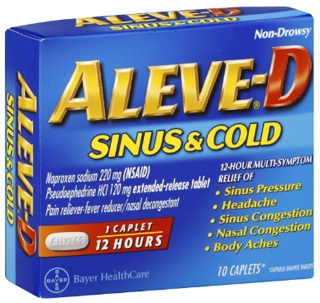Active Ingredient Overview
Aleve contains the active ingredient naproxen sodium, a nonsteroidal anti-inflammatory drug (NSAID). Naproxen sodium works by inhibiting the enzymes COX-1 and COX-2, which play a key role in the synthesis of prostaglandins. Prostaglandins are compounds involved in the inflammatory response, so by reducing their production, naproxen sodium effectively alleviates pain and reduces inflammation. This mechanism of action provides relief for various conditions, including headaches, muscle aches, dental pain, menstrual cramps, arthritis, or other forms of acute pain.
Available Dosage Forms
Aleve is available in several dosage forms, primarily oral tablets and capsules. It can be found in convenient over-the-counter formulations, most commonly in 220 mg doses of naproxen sodium. Some manufacturers may offer it in additional strengths under different brand names or generics. Enteric-coated tablets are available for those who may experience gastrointestinal discomfort, helping to minimize irritation by releasing the medication later in the digestive tract. Additionally, Aleve may be available in liquid gel capsules for easier ingestion.
Therapeutic Indications
Aleve is indicated for the temporary relief of minor aches and pains associated with various conditions. These include arthritis, musculoskeletal pain, backaches, and headaches. In addition, Aleve is often used to alleviate symptoms associated with the common cold, reduces fever and body temperature, and manage the discomfort associated with menstrual periods. It is integral to follow dosing guidelines based on the indication, as higher doses may be necessary for conditions like arthritis to achieve therapeutic effectiveness.
Pharmacokinetics Details
After oral administration, Aleve is well-absorbed into the bloodstream, reaching peak plasma levels within 2 to 4 hours. The systemic bioavailability of naproxen sodium reaches approximately 95%. The medication binds extensively to plasma proteins, influencing its distribution throughout the body. The half-life of naproxen is approximately 12 to 17 hours, making it suitable for twice-daily dosing in chronic management or once-daily dosing for short-term therapy. This allows for continuous anti-inflammatory and analgesic effects with proper compliance to dosing schedules.
Drug Interaction Potential
Naproxen sodium can interact with several other medications, potentially altering its effects or increasing the risk of adverse effects. Patients taking anticoagulants such as warfarin may experience an elevated risk of bleeding. Co-administration with other NSAIDs, including ibuprofen, may increase the likelihood of gastrointestinal ulceration. Additionally, naproxen can affect renal function, so caution should be observed in patients on medications that are nephrotoxic or require renal clearance. Concurrent use with ACE inhibitors or diuretics may reduce the effectiveness of these treatments.
Recommended Dosing Guidelines
For adults and children over the age of 12, the usual dose of Aleve is 220 mg every 8 to 12 hours. It is crucial not to exceed 440 mg within a 12-hour period or 660 mg per day. Patients are advised to use the lowest effective dose for the shortest duration necessary. Special populations, such as the elderly or those with compromised liver or kidney function, may require dose adjustments. Prior consultation with a healthcare provider is recommended to individualize dosing according to specific needs and risk factors.
Storage and Handling Instructions
Aleve should be stored at room temperature, within a range of 20-25°C (68-77°F), to maintain its stability and efficacy. It is important to keep the medication in its original packaging to protect it from excessive moisture or light exposure. Patients should ensure the medication is securely stored away from children and pets to prevent accidental ingestion. Checking the expiration date before use is essential to guarantee the medication’s effectiveness and safety.
Clinical Pharmacology Insights
Naproxen sodium distinguishes itself among NSAIDs due to its prolonged half-life, allowing for sustained therapeutic action. By selectively inhibiting cyclooxygenase enzymes, it diminishes the production of mediators responsible for pain and inflammation. Naproxen sodium’s extensive protein binding also ensures a steady and controlled release of active compounds. Additionally, because of its relatively lower cardiovascular risk profile compared to other NSAIDs, Aleve may be preferred in certain patient populations with heightened cardiovascular concerns.
Common Side Effects
Common mild side effects of Aleve, experienced by some users, include gastrointestinal discomfort, such as stomach pain, heartburn, or nausea. Though these symptoms are typically temporary and manageable, persistent or severe occurrences should prompt immediate medical attention. Some individuals might also experience dizziness or drowsiness, which necessitates precautions against operating heavy machinery or driving. Ensuring adequate hydration and taking the medication with food can help minimize these side effects.
Metabolism and Excretion
Naproxen is predominantly metabolized in the liver, undergoing conjugation to form inactive metabolites. These metabolites are primarily excreted via the kidneys. Given the renal route of elimination, patients with renal impairment should exercise caution and may require dose modifications or increased monitoring. The metabolic pathways of naproxen ensure its degradation into compounds that are efficiently eliminated, reducing potential accumulation in the body.
Special Population Considerations
Pediatric use of Aleve is not recommended for children under 12 years without specific medical advice due to differences in drug metabolism and sensitivity. Geriatric patients may be more susceptible to adverse effects, especially related to renal function and gastrointestinal health, warranting lower initial doses and careful monitoring. Liver or kidney disease patients may experience altered pharmacokinetics, necessitating dose adjustments to avoid toxicity. Pregnant or breastfeeding women should evaluate potential risks and benefits with a healthcare provider as Aleve may impact fetal development or the infant via lactation.








Reviews
There are no reviews yet.